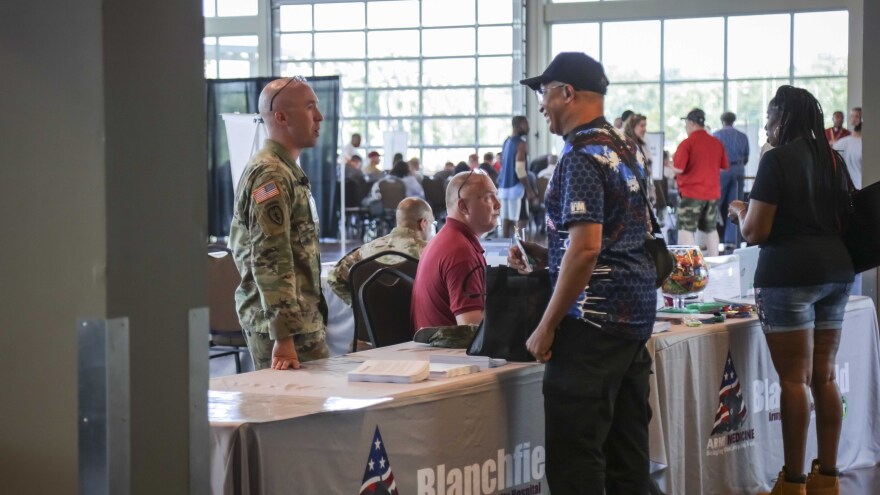Read the original story on WHRO's website.
Erica Fernandez joined the U.S. Navy in 2019. She eventually became a parachute rigger. The work was physical and demanding.
She ended up on the crew of the Navy’s newest aircraft carrier, the USS Gerald Ford, but a series of ailments began piling up.
“I have melanoma in my right eye, going blind in it,” she said. “I'm also going deaf in my right ear, and I have deteriorating discs in my lower back, and many other medical conditions. So when I didn't pass my last physical, they went ahead and discharged me.”
At 26 years old, she was medically separated from the Navy and applying for disability benefits through the Veterans Benefits Administration.
Fernandez has binders full of medical records that take up her couch in Portsmouth which helped her prove that some of her disabilities were service-connected.
“When I first got out, I immediately went ahead and put in my claim,” she said. “No waiting at all. It was almost instant. And I looked at the claim, I was reading it more and more in fine print, and I realized I didn't have half of my disability on there.”
She lost her appeal to add additional disabilities to her claim. Initial denials are not uncommon in the federal Veterans Affairs system but the delay put tremendous stress on the limited income of Fernandez and her spouse.
“I gave up. I completely gave up,” she said.”We gave up to the point where we sat here for roughly, I want to say, a year with a $1,500 a month income. We were losing our house, we were losing our car.”
Fernandez said she got a call from a company that said it was run by veterans and would help with her appeal.
“If you don't get any increase, we don't charge you,” she remembers the caller saying. “But if you do get an increase, we take one-third of your back pay. And I was like, ‘OK, you know what? That's fair because I need a lot of help.’”
She got another call from the company months later, saying the VA agreed to declare her 100% disabled.
“I dropped the phone. I hit the floor,” she said. “The back pay was going to save our house. The back pay was going to save our car.”
Then she got the bill. The VA granted her $11,000 in back benefits, but the company was charging her $10,000 dollars for their work on the appeal.
“How are they able to file on my behalf and turn around and take absolutely everything that was given to me?” she said.
Fernandez worked with Vetlink Solutions, an unaccredited company that is on the VA’s radar for its predatory practices. Companies like Vetlink are getting more popular and potentially defrauding more veterans, as more people apply for benefits under the federal PACT Act passed in 2022..
In response to an inquiry by WHRO, the VA’s Office of General Counsel said the Arizona-based Vetlink Solutions is not accredited by the VA.
Legally, the company cannot charge a fee to help veterans file appeals. The VA sent a cease-and-desist order to the company in July 2022 and another in September. The company has not responded to WHRO’s repeated requests for comment.

From 2018 through 2022, roughly 40% of all complaints filed with the VA were about unaccredited companies and individuals, according to the federal agency.
When lawmakers passed the statute governing the benefits process in 2006, they left out language allowing the VA to enforce criminal penalties on the unaccredited companies. Sen. Tim Kaine of Virginia is part of a coalition of lawmakers sponsoring legislation to return that power to the VA and provide additional caps on fees companies can charge veterans.
On the other side, a separate group of U.S. House lawmakers proposed a bill to make for-profit companies legal under the VA system.
In the meantime, the number of cases involving fraud has risen since Congress passed the PACT Act in 2022, which allowed millions of veterans to qualify for new benefits. A separate law has recently begun allowing all World War II veterans to begin receiving VA healthcare.
In 2022, the VA completed more than 1.7 million disability compensation and pension claims, which broke the previous year's record by 12%. The volume of claims is still at record levels.
The number of claims is also attracting companies charging predatory fees, said James Smith, the post commander at the Disabled American Veterans chapter in Portsmouth and senior vice commander in Virginia.
“It's unbelievable how I feel like they're robbing the veterans for services that should have been given to them for free,” Smith said.
Fernandez told him her story after she found out about the fees Vetlink Solutions charged. Smith said he wishes she had come to him first.
“We use the same VA system. We file the same paperwork with the VA, and we do it for free,” he said.
Organizations like the DAV, American Legion, Veterans of Foreign Wars and the state of Virginia will file the paperwork for veterans without charge.
Attorneys accredited by the VA can charge a fee, but only for appeals. The amount is capped at one-third of the back benefit. At the moment Smith said people like Fernandez, who signed contracts, may be on the hook for the money.
The White House recently announced a Veteran Scam and Fraud Evasion task force, which will educate veterans about companies that charge high fees and bring together federal agencies to use existing law to limit fraud.
In a written statement, the VA says it recommends vets who think they’ve been defrauded to contact their state’s attorney general or federal law enforcement.


